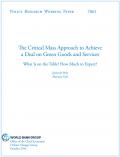As “green public procurement” (GPP) is playing an increasingly important role in stimulating the demand for environmentally friendly products and services, there is a strongly emerging need to analyse which factors drive the inclusion of environmental criteria in public tenders. Working on data from Italian municipalities, the authors confirmed that intensifying information and raising awareness on GPP techniques can strongly support the development of public green tenders. Moreover, their analysis reveals that good GPP performance cannot be achieved through the mere adoption of a certified Environmental Management System (EMS) by a public authority alone, but rather through the level of maturity of the certified EMS that provides a growing “value added” to GPP practices. Finally, findings of this study demonstrate that the relevant limitations linked to the small size of public authorities can be overcome by the progress in GPP brought by several European, national and local supporting initiatives.
This Discussion Paper presents a normative concept of green industrial policy, which is defined as encompassing any policy measure aimed at aligning the structure of a country’s economy with the needs of sustainable development within established planetary boundaries. The paper elaborates on the rationale of a green industrial policy, how it differs from conventional industrial policy, why it is faced with significantly bigger challenges, and how these can be met.
This paper provides a detailed explanation how the law of the World Trade Organization regulates environmental subsidies with a focus on renewable energy subsidies. The paper begins by discussing the economic justifications for such subsidies and the criticisms of them and then gives examples of categories of subsidies. The paper provides an overview of the relevant World Trade Organization rules and case law, including the recent Canada-Renewable Energy case. The paper also makes specific recommendations for how World Trade Organization law can be improved and discusses the literature on reform proposals. The study finds that because of a lack of clarity in World Trade Organizaion rules, for some clean energy subsidies, a government will not know in advance whether the subsidy is World Trade Organization-legal.

At the Davos forum of January 2014, a group of 14 countries pledged to launch negotiations on liberalizing trade in "green goods" (also known as "environmental" goods), focusing on the elimination of tariffs for an Asia-Pacific Economic Cooperation list of 54 products. The paper shows that the Davos group, with an average tariff of 1.8 percent, has little to offer as countries have avoided submitting products with tariff peaks for tariff reductions. Even if the list were extended to the 411 products on the World Trade Organization list, taking into account tariff dispersion, the tariff structure on environmental goods would be equivalent to a uniform tariff of 3.4 percent, about half the uniform tariff-equivalent for non-environmental goods. Enlarging the number of participants to low-income countries might be possible as, on average, their imports would not increase by more than 8 percent. However, because of the strong complementarities between trade in environmental goods and trade in environmental services, these should also be brought to the negotiation table, although difficulties in reaching agreement on their scope are likely to be great.
